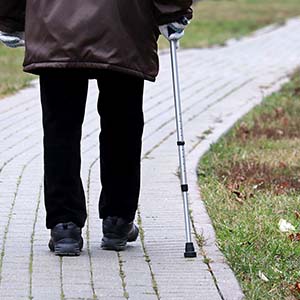-
Practical Considerations for Cannabis
People with cancer who are thinking about using cannabis to manage cancer-related symptoms should seek answers to some practical questions.
by Kate Yandell
-
An Emerging Treatment for Metastatic Prostate Cancer
A drug that delivers radioactive particles to prostate cancer cells increases overall survival for metastatic castration-resistant prostate cancer.
by Pamela Rafalow Grossman
-
Exercise, Cancer and Aging
A study on aging shows that cancer survivors are at higher risk of losing strength and walking more slowly compared to those with no cancer history. Exercise is one way to combat this decline.
by Marcus A. Banks
-
Preconceived Notions: Cancer, Fertility Coverage and the Law
Insurance coverage for fertility treatments is not mandated by federal law, although some states require it. People seeking cancer treatment need to understand their coverage and the law in their state.
by Shelly Rosenfeld
-
Drug Delays Recurrence in People With Early-Stage Breast Cancer
People who have inherited BRCA mutations and are at high risk for cancer recurrence may benefit from a PARP inhibitor.
by Pamela Rafalow Grossman
-
Open Medical Records: Pros and Cons
Patients now have full access to their online medical records. What are the benefits and downsides?
by Jen Tota McGivney
-
Remote Care
After adapting remote patient monitoring programs to cancer patients with COVID-19, cancer centers delve deeper into the programs' value for cancer patients undergoing treatment.
by Jon Kelvey
-
Moving Away From the Maximum Tolerated Dose
The FDA recently expressed a new commitment to testing cancer drugs at lower doses, rather than defaulting to the highest dose most people can tolerate.
by Marcus A. Banks
-
The Individual Sphere of Influence
Can discussion of health inequities lead to actionable change?
by Marci A. Landsmann
-
A Treatment That Came Just in Time
Cancer survivor Laurie Adami reflects on her experience participating in a clinical trial that ultimately contributed to the March 2021 approval of a CAR-T cell therapy for follicular lymphoma.
by Laurie Adami
Cancer Talk
Biotin Supplements Can Skew Cancer Lab Results
Products containing biotin can alter lab tests for people during and after cancer treatment.
by Laura Gesualdi Gilmore
Connecting More Patients to Cancer Clinical TrialsAACR conference brings experts together to discuss strategies to reach people historically left out of cancer research.
by Eric Fitzsimmons
Treatment Combination Improves Survival in EGFR-positive Lung CancerAdding chemotherapy to targeted therapy improves outcomes for people with advanced EGFR-positive non-small cell lung cancer.
by Sandra Gordon
Lessons From 20 Years Living With CancerMultiple myeloma survivor Jonathan Gluck reflects on uncertainty, and the scientific progress that has kept him living with cancer for more than two decades.
by Eric Fitzsimmons














